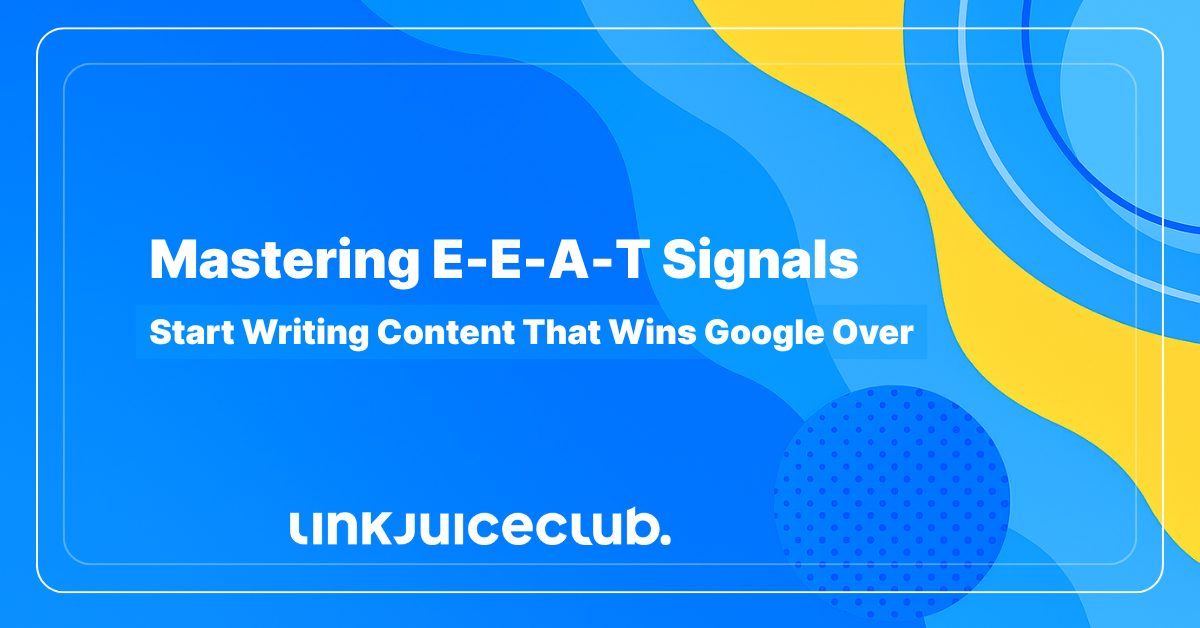
Mastering E-E-A-T Signals: Start Writing Content That Wins Google Over
Ever feel like your beautifully crafted, keyword-stuffed masterpiece is waving desperately at Google… but getting ghosted? Yeah, we’ve all been there. You’re ticking the SEO basics, writing with purpose, and delivering value, but your rankings are flatter than last week’s soda. So, what’s happening?
Here’s the plot twist: Google’s playing a new game, and the rules revolve around E-E-A-T signals – Experience, Expertise, Authoritativeness, and Trustworthiness. And if your content isn’t radiating strong E-E-A-T signals, it might as well be invisible.

But here’s the deal… Establishing E-E-A-T signals isn’t about throwing in fancy author bios or citing a stat or two. It’s about weaving authority into the bones of your content, and that starts with how you approach keywords.
Break Content Into Intent-Driven Pages (Not Walls of Text)
Not too long ago, it was common practice to throw every piece of information into one long-form article. If you covered the what, why, how, tools, and trends of a topic in a single mega-guide, Google gave you a thumbs-up.
This worked well before machine learning updates like BERT, MUM, and AI Overviews came into play.
But things have changed! 💣
Google’s focus today is less about keyword coverage and more about search intent. It wants the most relevant answer based on why the user is searching. That means matching content to the specific stage of the user’s journey.
Take the query: What is SEO? A few years ago, a 5,000-word article might have ranked first. Today, Google will likely surface a brief, clear explanation, because it sees that query as top-of-funnel. The user just wants to learn, not compare services or make a purchase.
So instead of cramming every angle of a topic into one page, split it up. One page should explain the basics. Another can explore tools. A third might compare pricing or service providers. Each page should do one job well, and speak directly to the user’s intent at that moment.
E-E-A-T Loves a Name Drop (When It Actually Means Something)
If you’re not backing your content up with credible people, trustworthy sources, and real-world recognition, Google’s just not that into you.
Welcome to the world of entity SEO, where who says something matters just as much as what’s being said. Think of entities as recognizable, authoritative figures in Google’s eyes: authors, brands, experts, organizations, even well-documented ideas.
The more your content is tied to these credible entities, the better your E-E-A-T signals perform.
So how does Google play the name game? Simple. It wants to know whether the person writing your article actually knows their stuff. Is this some anonymous ghostwriter with zero digital presence? Or is it a legit expert with a track record, a LinkedIn trail, and published work that’s been cited in respected corners of the internet?
If your content references big-name experts or trustworthy sources – and links to them – Google picks up on that. It sees you as part of a larger, credible conversation, not some outlier spewing random takes.
Semantic Keywords: The Unsung Heroes of Contextual SEO Greatness
Once upon a time in SEO land, keyword stuffing was king. You could toss your main keyword into every other sentence and somehow trick the algorithm into thinking your content was gospel. But those days are gone.
Now, semantic keywords matter, the contextually relevant sidekicks your primary keyword has been waiting for.
Semantic keywords are related ideas, themes, and concepts that Google associates with your main topic.
Let’s say your main topic is plant-based cooking. You’ll want to support that with semantic allies like vegan protein sources, nutritional yeast, dairy-free alternatives, meat substitutes, and whole food recipes.
So how do you find these golden nuggets?
Easy: start with Google itself. Scroll through the People Also Ask section, peek at related searches at the bottom of the SERP, and see what questions are trending.
Want to dig deeper? Use tools like SEMRush or MarketMuse to uncover semantic keyword goldmines.
But here’s the trick: don’t just sprinkle semantic keywords around like SEO fairy dust. Integrate them naturally. Use them where they make sense, where real people would actually read them and think: Yeah, that makes sense.
Speak Google’s Language: Let Schema Tell Your Story Loud and Clear
Want Google to stop squinting at your site trying to guess what you’re all about? Give it a map. Better yet, give it Schema markup. This behind-the-scenes code acts like a name tag, résumé, and credibility badge all in one. It spells out exactly who you are, what your content covers, and why you’re worth paying attention to.
By implementing Schema, you’re handing search engines a crystal-clear blueprint of your authority and trustworthiness. And in the age of E-E-A-T signals, that’s pure gold.
Let’s break it down:
💥 Author Schema: Shine a spotlight on your credentials. Let Google (and your readers) know that your content isn’t written by a mystery figure but by an actual expert with receipts.
💥 FAQ Schema: Got answers? This markup helps you land in those fancy collapsible Q&A sections right in the search results.
When done right, Schema can land your content straight into Google’s rich snippets, which means more eyeballs, more clicks, and more trust, without needing to shout about it.
Tools like Schema Markup Generators can whip up the necessary code for you. Just plug in your info, validate it, and drop it into your blog post.
Go Niche or Go Home
Trying to rank for YMYL topics – aka anything that touches someone’s health, money, or legal well-being – is like showing up to a Michelin cook-off with a microwave dinner. Google wants certified pros with names, faces, degrees, and a history of not accidentally sending people to the ER.
So if you’re thinking about going head-to-head with giants like WebMD or the IRS’s official site, take a deep breath. Unless you’ve got a PhD, a federal license, or an MD behind your name (plus a stack of credentials longer than your grandma’s grocery list), it’s going to be rough.
But here’s where it gets interesting: you don’t need to take down Goliath. You just need to be smarter.
Instead of targeting ultra-competitive monsters like best credit cards or how to treat high blood pressure, zoom in. Find the crevices Google hasn’t over-policed yet. Some good examples are credit cards for freelance designers with no annual fees or low-sodium diet tips for seniors with diabetes. Less traffic? Sure. But way more room to breathe and actually rank.
Extra Keyword Tactics to Juice Up Your E-E-A-T Signals
If you really want to improve your rankings, it’s time to go beyond the basics and into the wild. Below are some advanced keyword optimization techniques, less talked about, often overlooked, and absolutely effective when done right! 🎉
Speak the Language of Credibility
Certain keywords establish your position as a pro. Use terminology that naturally signals authority and expertise. Basically, those are keywords like data-backed, industry-tested, peer-reviewed, featured in, or trusted by.
Find the Cracks the Big Dogs Miss (and Fill Them)
While industry titans battle over the most obvious keywords, you can sneak through the back door. Look for content gaps, questions users are asking that no one’s properly answering. Whether you’re scanning Quora threads, diving into Reddit rabbit holes, or using SEMrush’s Keyword Gap tool, the goal is simple: find the blind spots and plug them with content that showcases your experience and insight. That’s how trust is earned.
Structure for Trust, Not Just Traffic
A beautifully written piece is only half the battle. You need to make sure your content is structured in a way that supports your authority. Link out to credible sources. Name your authors and show off their credentials. Organize your content around verified entities and topics that matter in your niche. Structure and substance together? That’s when E-E-A-T shines brightest.
E-E-A-T Signals Are the Secret Sauce Behind SEO Wins
If you’re still chasing rankings with content alone, you’re playing an outdated game.
So don’t just optimize – legitimize. Build your expertise, earn your authority, prove your trustworthiness, and let experience shine through every keyword and entity.





